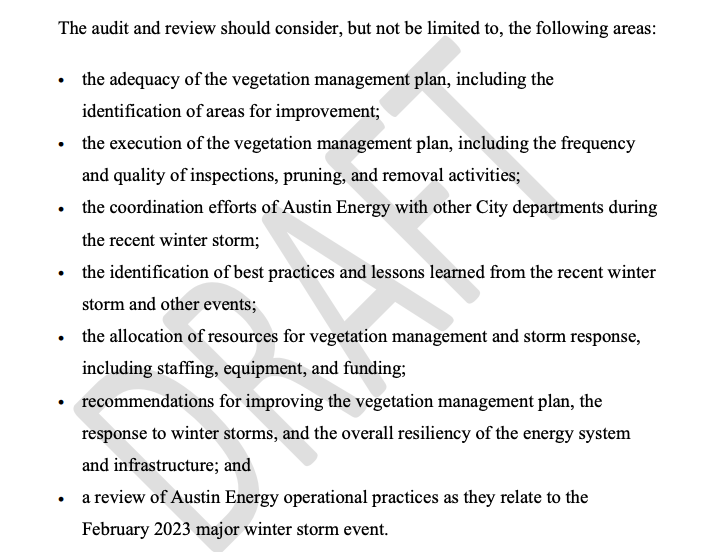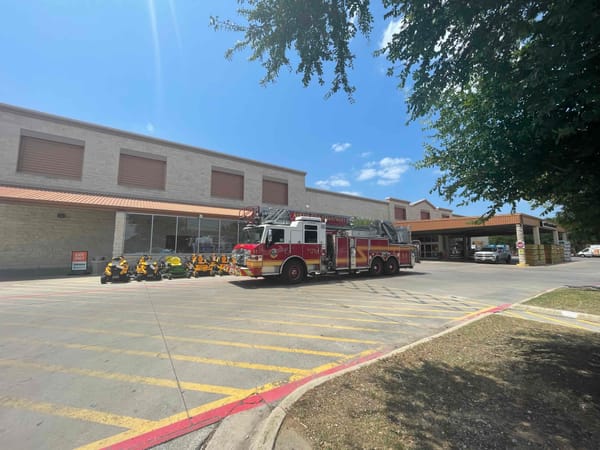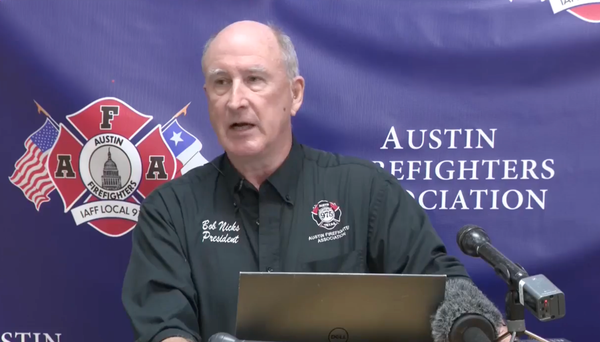Firing Spencer Cronk won't avert future disasters
Climate resilience has more to do with policy than management.

City Manager Spencer Cronk appears to be at high risk of getting fired after five years on the job.
This morning Mayor Kirk Watson, who is at home recovering from Covid, posted a statement on the Council message board announcing the addition of an emergency item to the agenda for Council's meeting on Thursday "to evaluate the employment of City Manager Spencer Cronk." Council members Alison Alter, Chito Vela and Vanessa Fuentes are co-sponsors.
"I added the emergency item to the agenda this morning because the management of this situation and the lack of clear, timely and accurate communication has left our community in the dark," wrote Watson. "It is unacceptable. The City of Austin can and will do better."
While stressing that he had not yet made a decision on Cronk's employment, Vela told me by phone that he was "deeply dissatisfied with the city's communications with the public" in recent days.
While sympathizing with the uncertainties the city faced in addressing the effects of such a severe storm, Vela insisted it could have immediately provided clearer information about the extent of the damage and managed expectations about when power would be restored. For instance, he wondered, could it have offered people more specific guidance based on the damage experienced in a given neighborhood?
The city should have abided by the old adage, "underpromise, overperform." Instead, it initially made promises that it later had to walk back.
"That kind of drip, drip, drip of bad news was maddening," said Vela. "I've been trying to respond to everybody that's on social media. Everyone's like, 'I need to know. Do I get a hotel? Do I go to my brother's house?'"
Vela, who has been on Council a year, said he felt similarly about the city's communications in response to the water boil notice last February.
Council Member Paige Ellis, who was one of three to abstain from the vote authorizing Cronk's pay raise in December, also appears open to giving him the boot.
"This was his chance to show he could communicate effectively in times of emergency," she wrote by text. "And he still didn't do it."
Although Cronk has been the subject of varying levels of criticism from Council members and staff throughout his tenure, relatively few of his critics have been willing to bash him publicly. Council Member Alison Alter has been a notable exception.
Even those who have been unimpressed with his leadership on a range of issues have doubted whether it is worth the trouble of firing Cronk and conducting a lengthy search process for a replacement who may very well prove to be no better. Council members have also been wary of the consequences of being on the losing side of a vote to fire the person they depend on to implement their policies.
In December, Council quietly approved a $38k raise Cronk requested. Alter was the only one who spoke against. She highlighted the city's struggles to recruit and retain workers, which she attributed in part to low morale among city employees. She also recalled Cronk's refusal to fire Chief Brian Manley after APD's disastrous response to the 2020 protests, which has already cost the city $16 million in settlements with injured protesters. Finally, she revealed that a top city executive had referred to Alter with a derogatory term in a conversation with colleagues after Alter had requested documents related to Cronk's compensation. Alter heard the conversation because the employee in question accidentally called Alter and had her on speaker phone.
The two who spoke up in support of Cronk in December who are still on Council are Leslie Pool and Mackenzie Kelly, both of whom lauded his professionalism and work with their offices.
Former Mayor Steve Adler did not comment on his performance, saying that he was approving the pay raise in recognition of the "majority sentiment" among those who would continue in office. "The relationship with the manager belongs to the next Council," he said.
Watson has long been rumored to be interested in getting a new city manager. Since his election, he has refrained from judgment when asked to opine on Cronk, telling Community Impact last month, "I don’t want to be doing performance reviews of people I haven’t been working with."
I sought comment from every Council member on the item.
Calling the storm response "beyond frustrating," Vanessa Fuentes said "it's time for solutions and accountability, not excuses."
Mackenzie Kelly did not take any shots at the storm response, but said, "I look forward to working with my colleagues to evaluate City Manager Spencer Cronk's performance and make the best decision for Austin going forward."
Alison Alter was unsparing in her criticism, saying, "Our city cannot afford another disaster. We must rebuild the competence of the organization and we must restore the trust of our residents that we have so severely damaged. After repeated disasters and mismanagement our constituents deserve honesty and accountability."
Aides to Leslie Pool and Ryan Alter declined to comment at the time. Zo Qadri, Jose Velasquez and Natasha Harper-Madison did not immediately respond to requests for comment.
We're facing a management crisis & a policy crisis.
Long-time readers of this newsletter know that I have never been impressed with Cronk, based both on what I've seen in public and what I hear from those who deal with him at City Hall.
But this disaster does not merely reflect a management problem. It is a policy problem that demands a response from those who are tasked with crafting policy: City Council.
It is our self-purposed progressive City Council that needs to get serious about preparing for a future in which extreme weather events are more common due to climate change. It is up to our elected leaders to make the case to their constituents for major investments in climate resilience.
Hiring a better city manager will not put Austin in a much better position to weather another storm. Spending more on vegetation management and spending to bury more utility lines could likely make a big difference, however.
We need policymakers who are willing to think long-term. I don't mean five or ten years. I mean 25, 50, 100 years.
If Mayor Kirk Watson wants to be remembered as the man who set Austin on track to succeed in the last three quarters of the 21st century, then his top infrastructure priority should not be a highway expansion that will induce more carbon emissions and more unsustainable sprawl development. Sprawl is not only bad for the environment but it's more expensive to service, straining our already precarious local government budgets. This storm is a perfect display of the challenges of serving a widely-dispersed city.
Instead, setting Austin up for climate resilience should be the top priority on Council. Like:
- Land use policies that encourage compact and connected neighborhoods, allowing people to be less reliant on cars
- Continued investment in pedestrian, bike & transit infrastructure.
- Strategic reallocation of roadway space from cars to other modes (transit/bike/ped)
- Planning for long-term access to water in the event of severe drought
- Wildfire planning and management
- Weatherizing utility assets and burying utility lines
- Significantly increase budget for vegetation management near utility equipment and significantly reduce tolerance for uncooperative homeowners
- Strategic tree planting to reduce urban heat island, capture carbon and make walking/transit more pleasant
- A robust network of disaster relief hubs around the city where people, including the homeless, can seek shelter in an emergency.
I'm sure I'm forgetting something, but that's the general idea. Some of this agenda costs money in the form of property taxes, electric rates and water rates. Other parts of it generate money and reduce spending: compact and connected development. And all of it, of course, should save us all money, time and heartache in the long-run by averting the types of calamities that we're dealing with now.
Hiring competent managers will make it easier to implement this agenda. But a competent manager goes a lot further if he or she is supported by leaders on Council who are willing to come up with bold solutions and sell them to the community.
So my message to the mayor and Council: You have the community's attention. Yes, many of them are angry and just want to see heads roll. But many others are eager to learn about changes that transcend personnel. What are the changes we can make that will protect current and future Austinites no matter who is city manager in 5, 10, 50 years?
For the second time, Pool pushes back on AE audit
On Saturday Mackenzie Kelly laid out a resolution calling for an audit of AE's response to the storm and outages. It called for a report by September that provides information on the following:

The resolution is sponsored by Kelly, Vela, Ryan Alter and Jose Velasquez. Curiously, Leslie Pool, the chair of the Austin Energy Oversight Committee, posted a response on the message board objecting to the audits.
"We will have abundant opportunities to sift through what we just experienced, to probe for answers, and I intend to ensure our professional staff have appropriate and necessary time to finalize their after-action reporting," she said. "We do not know what that report will tell us and that is why I do not support your call for audits at this time. Instead, I want to review outcomes and scope a responsible action after assessing the situation."
Pool said something similar when her colleagues proposed an audit in the wake of Winter Storm Uri. She worried that the audit would be "duplicative" and that it wasn't Council's job to wade into the weeds of utility management.
“I’m concerned about layering more and more work on top of our staff. Especially since, as these crises come, we don’t take anything off of our plate or their plate and we simply add more and more detail and a deeper dive and we don’t add staff,” she said. “So I’m not really sure about [staff] capacity.”
In other words, she trusted the utility to provide answers. She didn't think we needed an outsider (the city auditor) to poke around.
Pool was wrong then and she's wrong now. And I doubt that her effort to derail the audit will succeed.
What about burying the lines?
I would like to see something specific on burying utility lines. How much would it cost to bury all or various percentages of our infrastructure?
Vela, who has called for burying the lines, told me he thinks there is appetite among his colleagues to investigate the idea. He floated the idea of a $200 million "bond" to start the process. I asked him if he meant a voter-approved bond backed by property taxes or a utility bond backed by ratepayers; he said he wasn't sure exactly how it would be paid for.
The most logical course of action is for the utility to authorize the bonds, as it regularly does for capital projects, and to price any resulting costs into future rates. I don't know if the fact that City Council just approved new rates a few months ago complicates this; it probably does. Typically Council approves new rates every five years.
Due to the importance of this subject, I am making this post public and free. If you value my reporting, you can continue to get full daily access to breaking news and analysis on local politics by becoming a subscriber.





